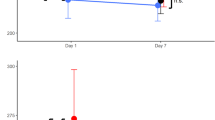Abstract
THE relationship between temperature and the mean hatching time of eggs is of the same pattern for most insect species. The mean hatching time decreases as the temperature increases until the so-called peak temperature is reached; this is the temperature at which the mean hatching time attains its minimal value. At temperatures above the peak, the observed mean hatching time increases with increasing temperature.
This is a preview of subscription content, access via your institution
Access options
Subscribe to this journal
Receive 51 print issues and online access
$199.00 per year
only $3.90 per issue
Buy this article
- Purchase on Springer Link
- Instant access to full article PDF
Prices may be subject to local taxes which are calculated during checkout
Similar content being viewed by others
References
Wigglesworth, V. B., The Principles of Insect Physiology (Methuen, London, 1950).
Stanley, J., Ecology, 27, 303 (1946).
Author information
Authors and Affiliations
Rights and permissions
About this article
Cite this article
MOUNTFORD, M. Relation of Temperature to the Duration of the Development of Insects. Nature 211, 993–994 (1966). https://doi.org/10.1038/211993a0
Issue Date:
DOI: https://doi.org/10.1038/211993a0
Comments
By submitting a comment you agree to abide by our Terms and Community Guidelines. If you find something abusive or that does not comply with our terms or guidelines please flag it as inappropriate.



